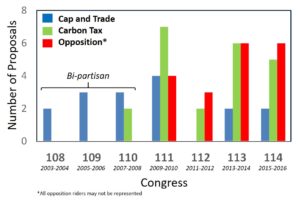Republicans Come Back to the Table
Posted: February 17, 2017
On February 8, eight senior Republicans proposed a U.S. federal carbon tax and dividend, which they call a “Carbon Dividends Plan”. The plan includes four elements or “pillars”:
- A tax on CO2 emissions only, steadily increasing from a start at $40/ton CO2,
- A equal dividend to all Americans with a valid Social Security Number,
- A border adjustment for goods coming from countries without similar taxes or costs,
- Roll-back of regulations put in place by the EPA, such as the Clean Power Plan, and release of tort liability for emitters.
The proposal is similar to the Citizens’ Climate Lobby proposal, with the addition of regulation roll-backs. A similar plan was also described as a possible Republican opportunity on this website in 2015. The Carbon Dividends Proposal is a natural evolution of changes we have recently seen among some Congressional Republicans. But until now, Republicans have lacked the strong leadership necessary to move ahead.
Hope for Bipartisan Discussions
Although Congressional actions for carbon pricing started out as bi-partisan efforts, since 2010 the issue has been  one of complete political polarization.
one of complete political polarization.
Congressional efforts began in earnest from 2003-2008 when bi-partisan attempts for cap and trade were proposed, including the Lieberman-McCain efforts. By the 111th Congress (2009-2010) Democrats were the primary proponents. The Waxman-Markey cap-and-trade bill passed the House after significant compromising in 2009, but failed in the Senate. Since then proponents’ bills have shifted more to carbon tax, (all from Democrats) and opposition has increased (all from Republicans). By 2016 there were signs that some Congressional Republicans are recognizing climate change and moving to find solutions.
With Republicans back at the table, we can hope for a move away from polarization to bi-partisan discussions and possible compromises.
